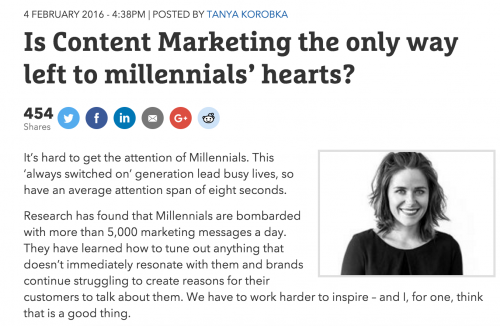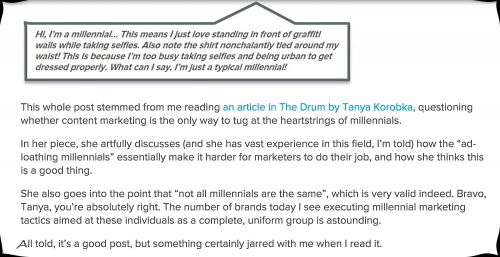“Millennial Marketing” Isn’t Defined By Age Group

I love to see my article spark a discussion and controversy in the marketing community.
In her recent “Millennial Marketing as a tactic. Please, desist!” Lauren Archer brings up a very interesting point.
Lauren says that when marketers are concentrating on “Millennial marketing” they’re not addressing any needs at all, because Millennials do not exist as a demographic.
One thing before we dive into it: age is not the main thing that united Millennials.
The articles you read about how all Millennials love taking selfies, share content like crazy and desperately want to interact with brands, are the articles that are written by unsupervised interns, who get these ideas on the first page of Google.
This demographic is far too large to effectively target by age. There is a bigger difference between 16-34 than say 36-54 year olds. It’s because we go through a fundamentally formative development around the age 23-26. This is where we actually start to get a grip of who we are and what we want. 16 to 21 year olds are still in college and are very much influenced by their peers. On the other hand, 30+ adults, who are also considered Millennials, may not look for peer approval that much, and have different values and aspirations altogether.
Equally, 30+ adults can still live with parents, be single and have no stable job.
What that means is marketers cannot rely on age as a blueprint for determining a consumer’s place in society. Such patterns were more predictable in earlier generations, but Millennials are too diverse to be characterised by age.
There is, however, one thing that many Millennials (especially those born in western society) have in common – and it’s World Wide Web boom, the internet.
We are the first generation ever that has grown up with the internet in our own homes and that has revolutionised (not using this word loosely here) the way we think, interact and work.
Internet has given us flatter world, which has led to an open access to knowledge.
And, freely available knowledge has given us power.
When I talk about Millennial marketing, I don’t mean marketing to people aged 16 to 34, I mean marketing to people who have the knowledge and power to choose what to buy.
These are the people, who are more intelligent and socially conscious than any generations before.
To me “Millennials” has always been a term that is much more about mentality (breaking through the old ways of doing things) than just a generation.
Hence, “Millennial marketing” is any kind of marketing tactic, that refers to empowered modern consumers (regardless of their age).
It’s just so happened that people born in the late 80s and 90s were teens in 2002 when the dot-com bubble burst and web becomes ubiquitous for every household.
In 2002, new ideas for sharing and exchanging content ad hoc, such as Weblogs and RSS, rapidly gained acceptance on the Web.
This was a historical milestone, which changed our lives forever. As consumers, we are now:
- Mainly well-educated and darn marketing-savvy (i.e no tricks or hard sell)
- We do our own research to find unbiased information before we buy (i.e user-generated content and content marketing is the new marketing)
- We want maximum convenience at the lowest price (i.e fairly priced intuitive products and services)
- We use technology to our advantage because we consider ourselves to be responsible and active members of society and trade (i.e we can share good or bad experiences with our friends instantly).
“Millennial marketing” is age-agnostic, but it does exist.
Sure, it’s broad, but it gives us a simplified starting point. This simplified set of assumptions about who Millennials are and what they want, is an outcome of granular analysis into their background, attitudes and values.
And we, humans, like to make sense of the complex world by simplifying it.






